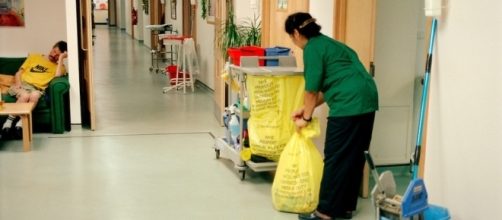They are the fatigued faces you walk past ready for your morning shift parallel to same time they finish their night shift. The overtime workers behind the tired smiled they exchange with you during the quick glance you spare them during your brief interactions in the corridors.
Cleaners - the invisible workforce
A handful of people see the majority of them as "the migrants who come in and steal our jobs"; and even more would undermine not only their job roles but also their roles in society. Many refer to them as "just Cleaners" and treat them accordingly.
Undoubtedly, if you were to ask domestic workers about their experiences in the workplace, the responses would vary with each individual case. Whilst the majority of domestic workers have reported above adequate working environments, there are a handful of workers who share a different experience. The treatment of domestic service assistants - the politically correct job title- in the private and public sector is a topic most known by the domestic workers themselves as they are part of what is described as an invisible workforce.
According to the National Guidance Research Forum, migrant workers make up roughly 40 percent of the English cleaning workforce. London alone has an estimated 250,000 immigrant domestic cleaners.
An industry once dominated by white working class women is now reliant on cheap foreign labour.
An unappreciated role
It is fair to say hat if it were not for our hard and patient domestics, let's face it, both our natural and working environments would rapidly go down hill. People would be left to clean up their own mess - which isn't necessarily a terrible thing. Teachers would have to stay beyond school hours to rub the graffiti off the walls - removing all traces of student proclamations of love because even if "Jack luvs Anna 4 eva", it has got to go. Office workers would have to clean their coffee ring stains once they have guzzled down their daily caffeine fixes; and nurses would have to make sure to remember to wash their hands in between coming into contact with patients, sweeping the floor and bleaching the toilets.
Assumptions about intelligence
Having been a domestic in a busy hospital, I have first-hand experience of some of the more unsavoury attitudes of supposedly 'professional' members of staff towards domestics. I understand what they can sometimes experience at times during their shift. I can recall a number of incidents in which somebody has walked through a pile of dirt that I had just swept and replied: "mind where you sweep" and continuing with no apology whatsoever. People often speak down to domestics - especially domestics who do not speak English as eloquently as native speakers - based on the assumption that because they are domestics, they are unintelligent.
Personal stories of abuse
I spoke to domestics from both private and public sectors about their experience.
Whilst the general consensus was positive, there were some stories of racial abuse, intimidation and what would now be considered as workplace bullying.
One domestic at a hospital who had been working there for over 10 years spoke about her experience, saying: "I was working in a ward when a patient's relative told me to get out. He used language that I don't care to repeat"
"I overheard him call me a 'dirty ape' and told me to 'go back to where I came from'. I reported it to my supervisor but because it was a visitor, there was not a lot that could have been done. The supervisor did take care of me even though she couldn't do as much as she wanted."
Britain's cleaning industry is worth £90 billion. Yet the migrant cleaners doing our dirty work are living in a secret world of abuse, intimidation, and illegality.

